Do you have a question about the MSI B150-ICAFE/ H110 PC MATE and is the answer not in the manual?
Introduction to the motherboard unpacking process and identification of included items.
Essential guidelines for handling components and preventing damage or injury during assembly.
Lists the necessary tools and hardware components for building the computer system.
Step-by-step instructions for installing the CPU onto the motherboard socket.
Guide on how to correctly insert DDR4 memory modules into the DIMM slots.
Instructions for connecting front panel power and reset switches, and LEDs to the motherboard.
Procedure for mounting the motherboard securely inside the computer chassis.
Steps for connecting SATA storage devices like HDDs and SSDs to the motherboard.
Detailed guide on how to install a graphics card into the PCIe slot.
Illustrates how to connect external devices like keyboard, mouse, and monitor.
Guide on how to connect the ATX power supply cables to the motherboard.
Instructions on how to correctly power on the assembled computer system.
Comprehensive technical details on CPU, Chipset, Memory, Expansion Slots, Graphics, and Storage.
Details on USB ports, Audio codec, LAN controller, and back panel connectors.
Information on internal connectors, I/O controller, form factor, and BIOS features.
Overview of supported software and MSI's exclusive motherboard features.
Illustrates the physical layout of ports on the rear I/O panel for B150-ICAFE and H110 PC MATE.
Explains the status and speed indicators for the LAN port LEDs.
Introduction to the Realtek HD Audio Manager utility for audio configuration.
Diagram showing the location of major components and connectors on the motherboard.
A table listing component names, types, and corresponding page numbers for details.
Detailed guide on the LGA 1151 CPU socket, including installation tips and precautions.
Information on DIMM slots, memory capacity, and important considerations for RAM installation.
Details on PCIe and PCI slots, including bandwidth and compatibility for expansion cards.
Explanation of SATA connectors for connecting storage devices and cable handling tips.
Guide to connecting front panel switches, LEDs, and audio to the motherboard headers.
Details on ATX power connectors, including pin assignments for stable operation.
Information on connecting USB 2.0 and USB 3.1 Gen1 devices to the front panel.
Details on front audio connector (JAUD1) and TPM module connector (JTPM1).
Information on optional serial port connector (JCOM1) and fan connectors (CPUFAN, SYSFAN).
Explains PWM and Voltage Mode fan connectors and how to control fan speed.
Details on parallel port connector (JLPT1) and Clear CMOS jumper (JBAT1).
Information on chassis intrusion detection and EZ Debug LED indicators for system status.
Methods for accessing the BIOS setup utility and understanding function keys.
Procedures for resetting BIOS to defaults and updating BIOS via M-FLASH or Live Update 6.
Overview of the System Status Menu for basic system settings like language, date, and time.
Detailed configuration options for PCI subsystems, ACPI, and integrated peripherals.
Settings for SATA mode, hot plug, HD audio, and integrated graphics configuration.
Options for USB controller, serial (COM) ports, and parallel (LPT) port settings.
Settings for fan speed control, temperature monitoring, and fan warning messages.
Configuration for power management features like EuP 2013 and Windows OS settings.
Options for fast boot, secure boot, and managing boot devices and wake-up events.
Configuration for system wake-up events via PS/2, USB, PCI/PCI-E devices, and RTC alarms.
Settings for CPU ratio, frequencies, voltages, and advanced overclocking modes.
Detailed controls for CPU features, memory profiles (XMP), and various voltage settings.
Options for DRAM timing configuration, memory fast boot, and CPU/DRAM/PCH voltages.
Information on CPU specifications, technology support, and features like Hyper-Threading.
Configuration for Intel Virtualization, VT-D, hardware prefetchers, and CPU power states (C-states).
Settings for CPU power saving states, CFG lock, EIST, Turbo Boost limits, and FCLK frequency.
Instructions for updating the BIOS and ME using the M-Flash utility on a USB drive.
Options for setting administrator and user passwords, and managing security features.
Configuration for Trusted Platform Module (TPM) and chassis intrusion detection.
Settings for boot device priority, boot mode selection (UEFI/Legacy), and logo display.
Options for discarding changes, saving settings, rebooting, and restoring default values.
Steps for installing Windows operating systems and necessary hardware drivers.
Guide for installing system utilities that complement the motherboard's features.
Overview of the COMMAND CENTER software for system monitoring, fan control, and overclocking.
Detailed settings for CPU fan speed control, CPU voltage, and DRAM/IGP parameters.
Explanation of advanced voltage, fan, DRAM settings, and real-time system monitoring features.
Using COMMAND CENTER's gadget mode and setting up remote control via mobile devices.
Guide to using LIVE UPDATE 6 for scanning and downloading the latest drivers, BIOS, and utilities.
How to use the Total Installer feature in LIVE UPDATE 6 for batch software installation.
Instructions for controlling motherboard and graphics card LED lighting effects.
Overview of M-CLOUD for enabling Wi-Fi AP, transferring files, and managing user accounts.
Steps to set up Soft AP for network sharing and connect to cloud storage services.
How to create user accounts, set permissions, and transfer files using M-CLOUD.
Guide to creating and managing a virtual RAM disk for faster temporary storage.
Explanation of NETWORK GENIE for optimizing network traffic and application priorities.
Steps to configure application network priority and manage internet speed settings.
Introduction to Intel XTU for tuning, testing, and monitoring system performance.
Solutions for power issues, no signal, boot failures, lost BIOS passwords, audio, network, and USB problems.
Statements regarding compliance with FCC rules and CE conformity directives.
Information on battery disposal, perchlorate material handling, and chemical substance regulations.
Statements on WEEE, environmental protection, and compliance with regional regulations (EU, JP, US, etc.).
Table detailing the presence of hazardous substances in components according to regulations.
| Brand | MSI |
|---|---|
| Model | B150-ICAFE/ H110 PC MATE |
| Category | Motherboard |
| Language | English |
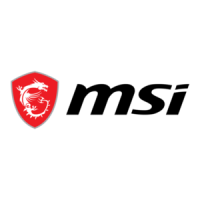






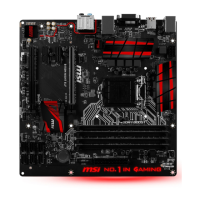
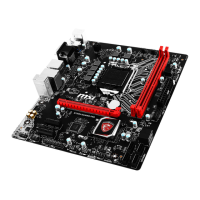
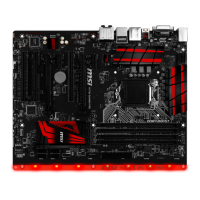
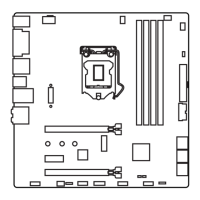

